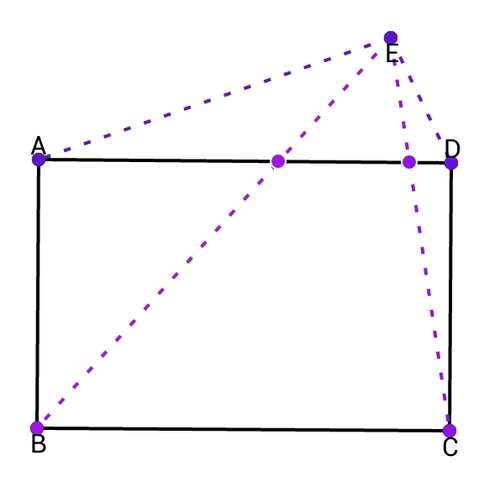Rectangle & a Point outside it
 A
B
C
D
is a rectangle such that
A
B
:
B
C
=
3
:
2
. There's a point
E
in its plane such that,
α
E
A
2
+
β
E
B
2
+
γ
E
C
2
+
δ
E
D
2
=
0
.
Find
α
+
β
+
γ
+
δ
A
B
C
D
is a rectangle such that
A
B
:
B
C
=
3
:
2
. There's a point
E
in its plane such that,
α
E
A
2
+
β
E
B
2
+
γ
E
C
2
+
δ
E
D
2
=
0
.
Find
α
+
β
+
γ
+
δ
The answer is 0.
This section requires Javascript.
You are seeing this because something didn't load right. We suggest you, (a) try
refreshing the page, (b) enabling javascript if it is disabled on your browser and,
finally, (c)
loading the
non-javascript version of this page
. We're sorry about the hassle.
5 solutions
this can be done using vectors
assuming E as origin and
AE= (vector) A
BE=(vector) B and similarily others
then use ( B-A ) = (C-D)
(D-A) . (B-A) =0
isn't it that each of the four unknowns equal to 0 satisfies the relation.
Not sure if this is the right method but if you write out the equation in matrices and the multiply both sides by the inverse of the matrix containing the angles, then you are left with the answer as 0.
For the sum to be 0 , the condition needs to be true for any point on the plane. That is, if for example β = − α , γ = α , δ = − α then for any α and any point on the plane, the condition is satisfied. Otherwise, there's an infinity of other points on the plane for which the condition is satisfied and yet the sum is not 0 .
Put 0 for all variable
This was a question based on the basic property of any rectangle. For a rectangle A B C D , if there is a point E in its plane then, E A 2 + E C 2 = E B 2 + E D 2 One can prove this using co ordinate geometry. Hence our answer is 1 − 1 + 1 − 1 = 0